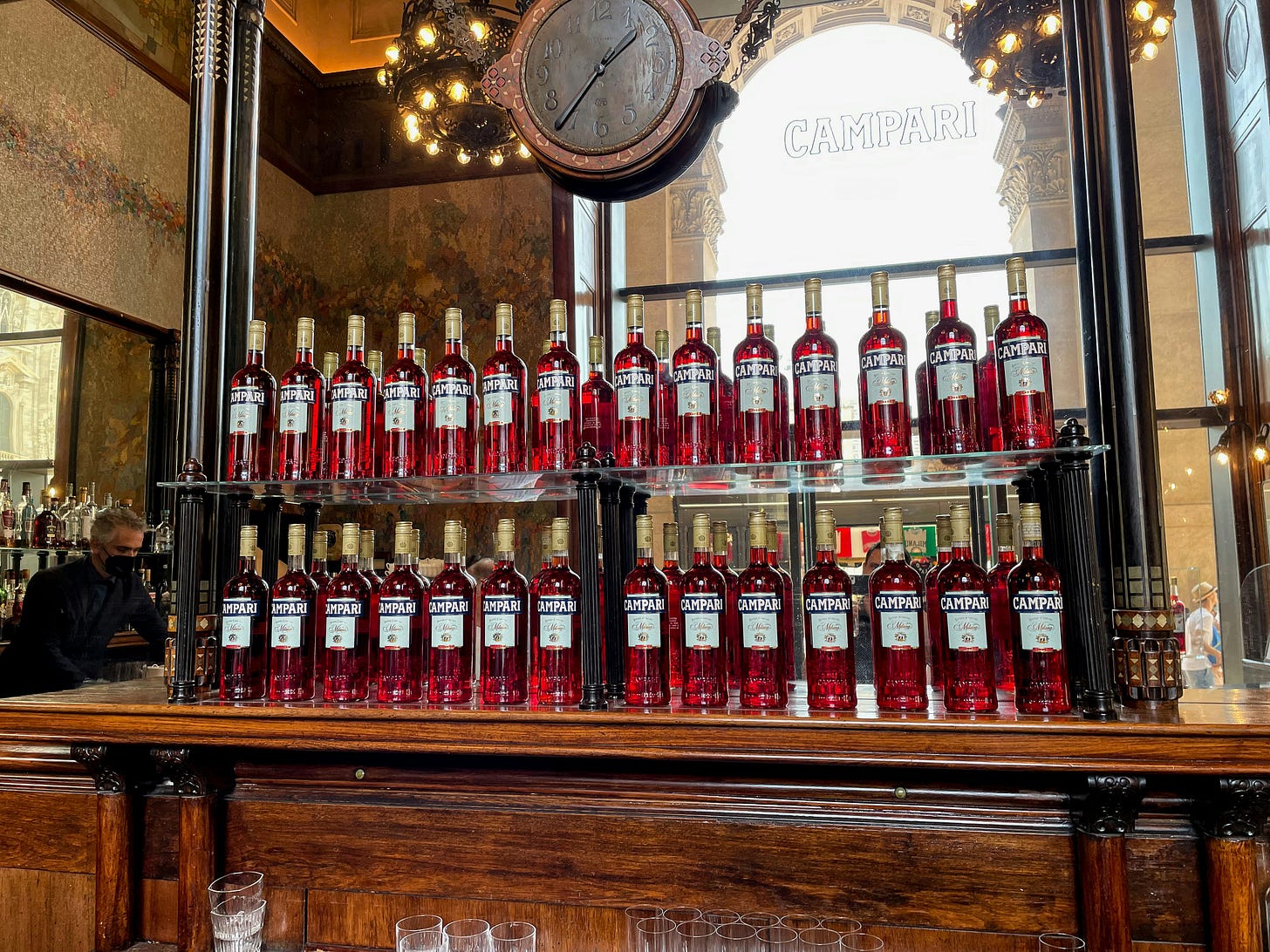
Note: this very short story was first published in 2017 as Campari in a now-defunct hipster arts magazine called Chroma. I wanted to call it The sweetness of life and the bitter herbs of death but they disagreed.
⁂
I no longer care much for opera, but above all I enjoy the company of fat people. Perhaps it is their great chests and huge lungs; they are so full of life. I am a thin man myself, but that cannot be helped.
When there are auditions or rehearsals, I might sit in one afternoon a week, and during the season you can also see me at the opera every Friday evening. I have a seat that is reserved for me even when I do not attend. Afterward I take a drink, or rather two drinks, always two, one not being enough and three being the threshold to another world. Sometimes when I am sitting at my chair, with my back to the wall, taking my drink, someone will stop and say ‘When will you favour us with another glorious production, maestro?’ I always answer—Never!—but then in public I compose more notes, so I can sit, ignoring the noise, watching magnificent swells of breath. Without the hope of another production it is possible that I would not keep my place, and I cannot afford to pay.
Otherwise in the evenings I will take a little broth, some pasta, perhaps a cutlet, and a glass of the thin local wine that tastes like cherries stewed in acid. I only truly relish the broth, and as often as not I do not finish even this. It is a performance for the sake of tradition and my landlady’s conscience; she would regard it as criminal to serve me less.
I drank beer when I was a communist, port when I wore tweed and affected to be an Englishman, and Barolo when I was a serious man of affairs: from boy to young man to middle-aged man. I have, of course, drunk many other things, but mostly they tell you nothing. For much of that time I enjoyed company, as I still do, even if I have lost my taste for conversation. Now I sit alone and watch; I no longer have any curiosity about what anyone will say, but it is good to see them talking. Like a baby, I can look on curiously but uncomprehendingly, without any concerns or ambitions so long as my small wants are attended to.
As I grew to be an old man I began to drink Campari. It is above all an old person’s drink, although they would have you believe otherwise. Who better to appreciate a moment of sweetness followed by the bitter herbs of death? But perhaps the great genius of Campari is in its colour. If it were green, or yellow, or even blue, its bitterness would seem intolerable, merely poisonous, but instead it is refreshing, stimulating, a cheerful memento mori.
Campari is carmine, a bright, almost lurid red that once came from crushed beetles. Look at it carefully; it seems to shift and glow, like a jewel. During my first enthusiasm, I made a small, unsuccessful joke about drinking Campari Burana. No one understood. I explained that Campari was carmine, carminio, and that there were carmina, songs or poems, and then there was Orff’s rather vulgar composition, the Carmina Burana…. It was a strange and hateful thing; I do not care for wordplay or explanations. My companions did not laugh politely or groan with me, they looked at me with concern as at an old man losing his wits, until I coughed to cover my embarrassment, and this then turned into one of what my landlady calls my murder-coughs. It was about this time that I withdrew from general converse.
At first I mostly drank Campari soda. This must be 50% Campari and 50% soda, and above all it must never be weaker. Sweetness is diluted more rapidly than bitterness, and too much soda will make your drink less sweet and more bitter. You might say that in this it is like age and the addition of too many years. Now I drink the Negroni, when my stomach is strong enough. It is the perfection of Campari drinking. Think of it like this: first there is the bittersweet Campari, which is above all bitter; then there is the sweet dark vermouth, a darker red; then there is the strong, clear gin for power. As comrade Marx said, life works through a moving balance of antithetical forces that fight and then find a synthesis and a higher order of being—this is the Negroni. Perhaps the dear doctor was mistaken in some things, but he would have made a noble bartender. Then at last there is the Negroni’s sanguine hue; it is profound, and perhaps it will not be so easily noticed if I happen to cough a little blood into my napkin when I am drinking. Above all, I do not care for concern.
⁂
Read my 2024 piece on the Negroni here.



